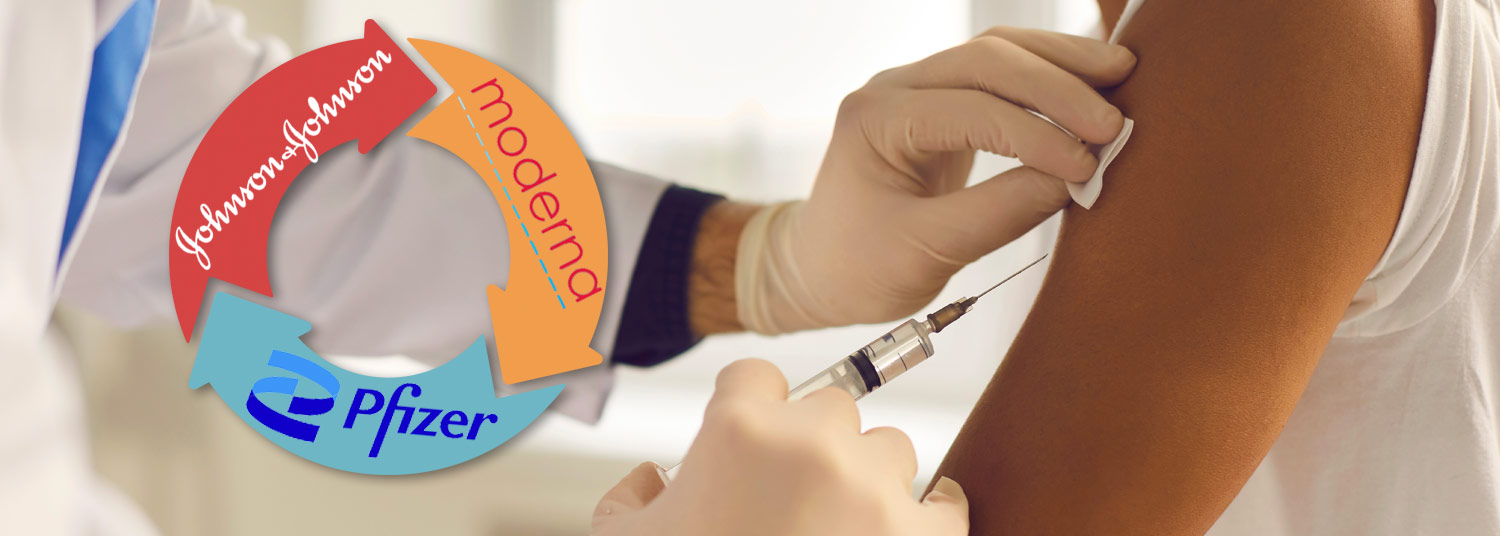January 26, 2022 | January Payne
Dr. Kirsten Lyke presented data – just published in NEJM – to FDA committee for approval

A University of Maryland School of Medicine (UMSOM), Center for Vaccine Development and Global Health (CVD), expert is co-leading an ongoing study that was pivotal in recommending adults and teens receive booster COVID-19 shots of their choosing starting in fall 2021. The preliminary clinical trial results, reported today in The New England Journal of Medicine, found that is safe and effective to receive boosters that are the same or a different one from the person’s primary vaccine(s).
Kirsten E. Lyke, MD, Professor of Medicine at UMSOM, is Co-Chair and site Principal Investigator for the study and presented data to the U.S. Food and Drug Administration’s (FDA) expert vaccine panel in October that led to the recommendation for mix-and-match booster doses following completion of Emergency Use Authorization (EUA) regimens.
“This study was pivotal in contributing knowledge about the safety and immune responses of mixing and matching primary vaccines and boosters,” said Dr. Lyke, who is also the Director of CVD’s Malaria Vaccine and Challenge Unit. “Boosters are critical against emerging variants of concern, such as the Delta and Omicron variants. The boosters provide an important tool to prevent severe disease, hospitalization, and death.”
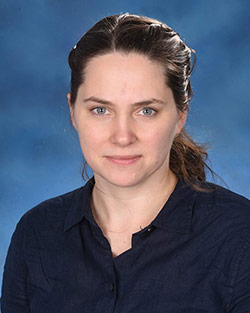 Meagan Deming, MD, PhD, Instructor of Medicine at the UMSOM, is Vice-Chair of the study, which is a collaboration between investigators at the UMSOM’s CVD and the Institute of Human Virology (IHV). IHV investigators Jennifer Husson, MD, MPH, Joel Chua, MD, and Angie Price, DNP, MSN, CRNP, worked with CVD faculty on this study. The UMSOM Vaccine Treatment and Evaluation Unit (VTEU) is part of the Infectious Diseases Clinical Research Consortium (IDCRC) that investigated the mix-and-match boosters.
Meagan Deming, MD, PhD, Instructor of Medicine at the UMSOM, is Vice-Chair of the study, which is a collaboration between investigators at the UMSOM’s CVD and the Institute of Human Virology (IHV). IHV investigators Jennifer Husson, MD, MPH, Joel Chua, MD, and Angie Price, DNP, MSN, CRNP, worked with CVD faculty on this study. The UMSOM Vaccine Treatment and Evaluation Unit (VTEU) is part of the Infectious Diseases Clinical Research Consortium (IDCRC) that investigated the mix-and-match boosters.
The newly published study found that for adults who previously received a full regimen of any COVID-19 vaccine granted EUA or approved by the FDA, an additional booster dose of any of these vaccines was safe and prompted an immune response. The ability to use vaccines for boosting that are different from those used for the primary series – mix and matching – can simplify vaccine booster administration.
These findings are from an ongoing phase 1/2 trial conducted under the UMSOM’s VTEU as part of the IDCRC and sponsored by the National Institute of Allergy and Infectious Diseases (NIAID) at the National Institutes of Health.
The NEJM report describes findings from 458 adult volunteers who had been fully vaccinated with one of the three EUA COVID-19 vaccines at least 12 weeks prior to enrollment. Of those volunteers, 150 study participants received a booster of Johnson & Johnson’s Ad26.CoV2-S vaccine; 154 received a booster of Moderna’s mRNA-1273 vaccine (100 microgram dose); and 154 received a booster of Pfizer-BioNTech’s BNT162b2.
The IDCRC trial, which began enrollment in May 2021, is led by Co-Chairs Robert L. Atmar, MD, of Baylor College of Medicine, Houston, Texas, and Dr. Lyke at the UMSOM.
“Mix-and-match is not a new approach. It is a well-known principle in vaccine science research. Mixing vaccine platforms can elicit a stronger, longer-lasting response than a single vaccine regimen and could help us fight variants,” said Dr. Lyke.
At 15 days after booster vaccination, serum antibody levels increased in all study groups, and leveled off by day 29. For a given primary EUA COVID-19 vaccine, administering a different vaccine as a booster elicited similar or higher serologic responses as compared to their respective homologous booster response. Additionally, T cell responses were measured. Cellular CD4 Th1 T cell responses directed against the spike protein increased in all groups except volunteers who received a single dose of Johnson & Johnson followed by a booster of Johnson & Johnson. However, CD8 T cell responses were more durable in Johnson & Johnson recipients and those who received an mRNA primary series followed by a Johnson & Johnson boost.
Booster vaccines may enhance waning immunity and expand the breadth of immunity against SARS-CoV-2 variants of concern. Heterologous prime-boost strategies may offer immunological advantages to optimize the breadth and longevity of protection achieved with currently available vaccines. They may also simplify the logistics of administering booster vaccines.
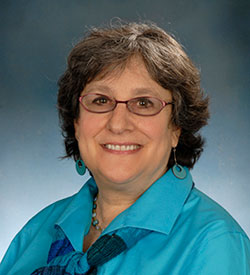 “Three COVID-19 vaccines have reached approval or EUA in the U.S. The vaccines made by Moderna and Pfizer-BioNTech are based on messenger RNA, while the Johnson and Johnson vaccine uses viral vectors. The ability to receive initial vaccinations using one approach, followed by a booster that uses the other approach offers an expanded range of possibilities,” said Karen Kotloff, MD, Professor of Pediatrics, Associate Director for Clinical Research in CVD, and principal investigator of the UMSOM VTEU. “For example, when supplies are short, or people have side effects to one type of vaccine, having this flexibility can be very important. This study provides reassurance that mixing and matching vaccines is a feasible approach that is well-tolerated and triggers strong immune responses.”
“Three COVID-19 vaccines have reached approval or EUA in the U.S. The vaccines made by Moderna and Pfizer-BioNTech are based on messenger RNA, while the Johnson and Johnson vaccine uses viral vectors. The ability to receive initial vaccinations using one approach, followed by a booster that uses the other approach offers an expanded range of possibilities,” said Karen Kotloff, MD, Professor of Pediatrics, Associate Director for Clinical Research in CVD, and principal investigator of the UMSOM VTEU. “For example, when supplies are short, or people have side effects to one type of vaccine, having this flexibility can be very important. This study provides reassurance that mixing and matching vaccines is a feasible approach that is well-tolerated and triggers strong immune responses.”
The trial participants kept diaries of any side effects and supplied blood samples on the day of booster vaccination and 15 days after boost. More than half of participants reported mild/moderate headache, pain at the injection site, muscle aches, and malaise, which was similar to the primary series. There were no vaccine-related serious adverse events reported.
Study participants will be followed for a year to assess longer-term immune responses. Additional COVID-19 vaccine candidates will be studied in the future.
 “We are fortunate to have some of the top vaccine scientists in the world in our Center for Vaccine Development and Global Health – such as Dr. Lyke – leading the way in COVID-19 vaccine research throughout the pandemic,” said E. Albert Reece, MD, PhD, MBA, Executive Vice President for Medical Affairs, UM Baltimore, and the John Z. and Akiko K. Bowers Distinguished Professor and Dean at UMSOM. “As we confront another variant of COVID-19 – this one the most contagious of all – the availability of the mix-and-match booster approach came just in time for successive waves of the Delta and Omicron variants and likely contributed to saving many lives.”
“We are fortunate to have some of the top vaccine scientists in the world in our Center for Vaccine Development and Global Health – such as Dr. Lyke – leading the way in COVID-19 vaccine research throughout the pandemic,” said E. Albert Reece, MD, PhD, MBA, Executive Vice President for Medical Affairs, UM Baltimore, and the John Z. and Akiko K. Bowers Distinguished Professor and Dean at UMSOM. “As we confront another variant of COVID-19 – this one the most contagious of all – the availability of the mix-and-match booster approach came just in time for successive waves of the Delta and Omicron variants and likely contributed to saving many lives.”
NIAID grants supporting this research are UM1AI48372, UM1AI148373, UM1AI148450, UM1AI148452, UM1AI148573, UM1AI148574, UM1AI148575, UM1AI148576, UM1AI148684, UM1 AI148689 and with support from the NIAID Collaborative Influenza Vaccine Innovation Centers (CIVICs) contract 75N93019C00050.
About the University of Maryland School of Medicine Vaccine Treatment and Evaluation Unit (VTEU)
NIAID established the Vaccine and Treatment Evaluation Units (VTEUs) in 1962 as centers of excellence for conducting clinical trials to develop new and improved vaccines and therapies against infectious diseases. The University of Maryland School of Medicine (UMSOM) investigators have been the recipients of this prestigious award for over four decades and have conducted hundreds of clinical trials (current award number 5UM1AI148689, Principal Investigator Dr. Karen Kotloff). An important role of the VTEUs is the capability to rapidly enroll and vaccinate large numbers of volunteers into trials according to the highest quality standards that can support approval and licensure. Rapid-response capability is especially important for testing vaccines to counteract emerging public health concerns such as pandemics. For example, VTEU investigators at UMSOM played leadership roles in trials which led to FDA approval of the 2009 swine flu vaccine strain and, more recently, COVID-19 vaccines. Another goal of the VTEUs is to develop new and improved vaccines against infections of public health importance. VTEU investigators at the UMSOM participated in the pivotal trial that let to licensure of FluMist, an influenza vaccine delivered by nasal spray. VTEU trials at UMSOM supported licensure of a cholera vaccine developed at CVD for travelers. The UMSOM VTEU continues to perform trials of vaccines that will strengthen the national stockpile of vaccines to prevent infections that could be used as a bioterrorist weapon against the U.S., such as smallpox and anthrax. The UMSOM VTEU investigates novel approaches to improve vaccine delivery particularly in low income countries. We conducted the first clinical study of an edible vaccine in 1998 using genetically engineered plants that contain vaccine antigens that might protect against diarrheal diseases. In keeping with our focus on bringing vaccines to underserved populations globally, we are conducting international studies for vaccines to prevent malaria, meningitis, and many others.
About Infectious Disease Clinical Research Consortium (IDCRC)
The IDCRC, consisting of the Vaccine Treatment and Evaluation Units (VTEUs) and the IDCRC Leadership Group (under award number UM1AI148684), was formed in 2019 to support the planning and implementation of infectious diseases clinical research that efficiently addresses the scientific priorities of NIAID. The consortium includes infectious diseases leaders and clinical researchers from Emory University, University of Maryland School of Medicine, Baylor College of Medicine, Cincinnati Children’s Medical Center and University of Cincinnati, FHI360, Fred Hutchinson Cancer Research Center, Johns Hopkins University, Kaiser Permanente Washington Health Research Institute, New York University, Saint Louis University, Vanderbilt University Medical Center, University of Alabama at Birmingham, University of Rochester, University of Washington, other affiliated sites and NIAID.
About the University of Maryland School of Medicine
Now in its third century, the University of Maryland School of Medicine was chartered in 1807 as the first public medical school in the United States. It continues today as one of the fastest growing, top-tier biomedical research enterprises in the world -- with 46 academic departments, centers, institutes, and programs, and a faculty of more than 3,000 physicians, scientists, and allied health professionals, including members of the National Academy of Medicine and the National Academy of Sciences, and a distinguished two-time winner of the Albert E. Lasker Award in Medical Research. With an operating budget of more than $1.2 billion, the School of Medicine works closely in partnership with the University of Maryland Medical Center and Medical System to provide research-intensive, academic and clinically based care for nearly 2 million patients each year. The School of Medicine has nearly $600 million in extramural funding, with most of its academic departments highly ranked among all medical schools in the nation in research funding. As one of the seven professional schools that make up the University of Maryland, Baltimore campus, the School of Medicine has a total population of nearly 9,000 faculty and staff, including 2,500 students, trainees, residents, and fellows. The combined School of Medicine and Medical System (“University of Maryland Medicine”) has an annual budget of over $6 billion and an economic impact of nearly $20 billion on the state and local community. The School of Medicine, which ranks as the 8th highest among public medical schools in research productivity (according to the Association of American Medical Colleges profile) is an innovator in translational medicine, with 606 active patents and 52 start-up companies. In the latest U.S. News & World Report ranking of the Best Medical Schools, published in 2021, the UM School of Medicine is ranked #9 among the 92 public medical schools in the U.S., and in the top 15 percent (#27) of all 192 public and private U.S. medical schools. The School of Medicine works locally, nationally, and globally, with research and treatment facilities in 36 countries around the world. Visit medschool.umaryland.edu
About the Center for Vaccine Development and Global Health
For over 40 years, researchers in the Center for Vaccine Development and Global Health have worked domestically and internationally to develop, test, and deploy vaccines to aid the world’s underserved populations. CVD is an academic enterprise engaged in the full range of infectious disease intervention from basic laboratory research through vaccine development, pre-clinical and clinical evaluation, large-scale pre-licensure field studies, and post-licensure assessments. CVD has worked to eliminate vaccine-preventable diseases. CVD has created and tested vaccines against cholera, typhoid fever, paratyphoid fever, non-typhoidal Salmonella disease, shigellosis (bacillary dysentery), Escherichia coli diarrhea, nosocomial pathogens, tularemia, influenza, malaria, and other infectious diseases. CVD’s research covers the broader goal of improving global health by conducting innovative, leading research in Baltimore and around the world. CVD researchers are developing new and improved ways to diagnose, prevent, treat, control, and eliminate diseases of global impact. Currently, these diseases include typhoid, Shigella, E. coli diarrhea, malaria, and other vaccine-preventable infectious diseases. CVD researchers have been involved in critical vaccine development for emerging pathogens such as Ebola and Zika. In addition, CVD’s work focuses on the ever-growing challenge of antimicrobial resistance.
Contact
January Payne
Director of Public Relations
(443) 203-8183
january.payne@som.umaryland.edu
Related stories

Tuesday, May 21, 2024
University of Maryland School of Medicine Launches Vaccine Development Program to Prevent Sepsis in Newborns
University of Maryland School of Medicine (UMSOM) researchers at the Center for Vaccine Development and Global Health (CVD) have been awarded up to $3.96 million over three years to develop and test a vaccine in an animal model that could eventually be used in pregnant women to prevent sepsis in newborns and infants.

Tuesday, April 30, 2024
Miriam K. Laufer Appointed Interim Director of the Center for Vaccine Development and Global Health
The University of Maryland School of Medicine (UMSOM) Dean, Mark T. Gladwin, MD, announced that Miriam K. Laufer, MD, Professor of Pediatrics, Medicine, and Epidemiology & Public Health, has been appointed as the Interim Head of UMSOM's Center for Vaccine Development and Global Health (CVD).

Tuesday, April 30, 2024
Miriam K. Laufer Appointed Interim Director of the Center for Vaccine Development and Global Health
University of Maryland School of Medicine (UMSOM) Dean, Mark T. Gladwin, MD, announced that Miriam K. Laufer, MD, Professor of Pediatrics, Medicine, and Epidemiology & Public Health, has been appointed as the Interim Head of UMSOM's Center for Vaccine Development and Global Health (CVD).

Thursday, October 12, 2023
UM School of Medicine's Kirsten Lyke Elected as Member of Prestigious National Academy of Medicine
Kirsten E. Lyke, MD, Professor of Medicine and Physician-Scientist at the Center for Vaccine Development and Global Health (CVD) at the University of Maryland School of Medicine (UMSOM), was elected this week as a new member of the National Academy of Medicine (NAM). She was recognized for her pivotal research in emerging infections and human challenge models that have informed and shaped global vaccine and public health policy.

Tuesday, December 20, 2022
COVID Vaccines Prevented 3 Million Deaths in the U.S., New Analysis Finds
In the two years since the first COVID-19 vaccines were given to patients in the U.S., the vaccines had the cumulative effect of preventing 18 million hospitalizations and 3 million deaths. That is based on a new modeling analysis conducted by a researcher at the University of Maryland School of Medicine (UMSOM) and her colleagues. Results of the analysis were published by the Commonwealth Fund.
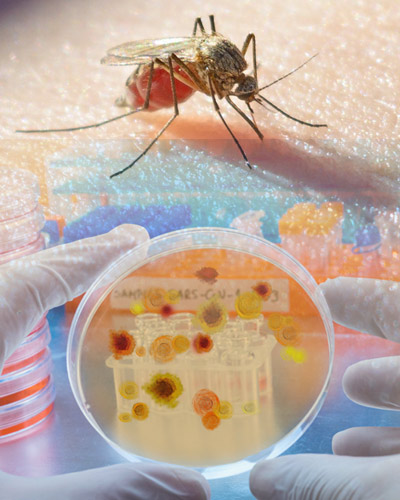
Monday, July 18, 2022
New Genomic Research Shows Why Testing Malaria Vaccines in the Clinic is as Rigorous as Natural Exposure in the Field
Malaria is the deadliest mosquito-borne parasitic infection of humans. In 2021, after a century of research, the World Health Organization (WHO) approved the world’s first malaria vaccine. That vaccine reduces the incidence of malaria infections in young children aged 5-17 months by only 30 percent, meaning that it remains critical to continue developing and testing more effective vaccines.
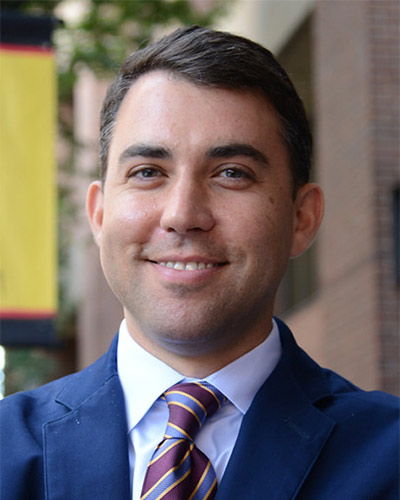
Wednesday, February 16, 2022
Study Shows New Drug Combination More Effective Against SARS-CoV-2
Researchers at the University of Maryland School of Medicine (UMSOM) and University of Pennsylvania Perelman School of Medicine have identified a powerful combination of antivirals to treat COVID-19. The researchers showed that combining the experimental drug brequinar with either of the two drugs already approved by the U.S. Food and Drug Administration for emergency use, remdesivir or molnupiravir, inhibited growth of the SARS-CoV-2 virus in human lung cells and in mice. Their findings suggest that these drugs are more potent when used in combination than individually.
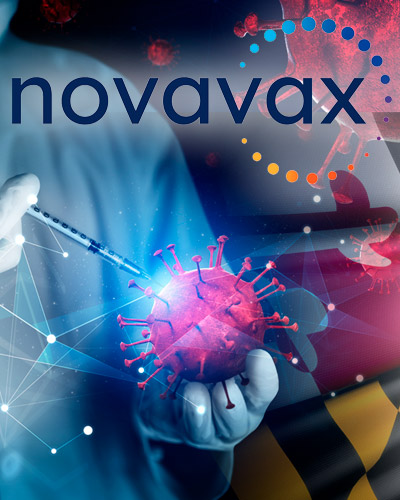
Thursday, December 16, 2021
Novavax COVID-19 Vaccine Found to be Safe and Effective in Phase 3 Trial Conducted by UM School of Medicine Researchers
An investigational COVID-19 vaccine made by Novavax was found to be 90 percent effective at preventing COVID-19 illness, according to results from a Phase 3 clinical trial published today in the New England Journal of Medicine. The University of Maryland School of Medicine’s (UMSOM) Center for Vaccine Development and Global Health served as one of the trial sites, and Karen Kotloff, MD, Professor of Pediatrics at UMSOM, served as Co-Chair for the trial protocol.

Tuesday, December 14, 2021
UM School of Medicine’s Office of Public Affairs and Communications Honored with 2021 PRSA ‘Best In Maryland’ Award
The University of Maryland School of Medicine (UMSOM)'s Office of Public Affairs & Communications received the Public Relations Society of America (PRSA) 2021 “Best in Maryland Award,” the PRSA’s highest honor, for its COVID-19 Communications program. The award was given at the PRSA Maryland Gala, held on December 9, 2021.

Wednesday, September 08, 2021
UM School of Medicine Reaching Underserved Communities Through Grass Roots Efforts to Increase COVID-19 Vaccination Rates
In an effort to increase COVID-19 vaccination rates among children and families, and ultimately help bring the pandemic under control, the Department of Family & Community Medicine (DFCM) and the Department of Psychiatry at the University of Maryland School of Medicine (UMSOM) are partnering with key community and faith-based groups in Baltimore city to reach the most vulnerable and underserved communities. This partnership will also extend across Maryland, Delaware, Virginia, and West Virginia.

Wednesday, July 07, 2021
UM School of Medicine Researchers Develop Two Rapid Tests for COVID-19 Using Innovative Techniques
Researchers at the University of Maryland School of Medicine (UMSOM) have developed two rapid diagnostic tests for COVID-19 that are nearly as accurate as the gold-standard test currently used in laboratories. Unlike the gold-standard test, which extracts RNA and uses it to amplify the DNA of the virus, these new tests can detect the presence of the virus in as little as five minutes using different methods.

Wednesday, June 09, 2021
Global Study of Microbes in 60 Cities Finds Each Has Unique Fingerprint of Viruses and Bacteria
Each city has its own unique microbiome, a “fingerprint” of viruses and bacteria that serves as type of city profile, according to a new study from an international consortium of researchers that included a team from the University of Maryland School of Medicine (UMSOM). The international project, which sequenced and analyzed samples collected from public transit systems and hospitals in 60 cities around the world, was published today in the journal Cell.

Tuesday, March 16, 2021
New Study Finds Healthcare Settings Do Not Pose Added Risk Factor for Covid-19 Infection Spread Among U.S. Healthcare Personnel
Healthcare personnel who were infected with COVID-19 faced stronger risk factors outside of the workplace than in their hospital or healthcare settings. That is the finding of a new study published today in the Journal of the American Medical association's JAMA Network Open conducted by University of Maryland School of Medicine (UMSOM) researchers and colleagues at the Centers for Disease Control and Prevention (CDC) and three other universities.

Thursday, January 21, 2021
UM School of Medicine Hosted Media Availability for Ensuring Trust in COVID-19 Vaccine Event
On January 22, 2021 at 2 p.m., the University of Maryland School of Medicine (UMSOM) hosted Black faith-based leaders, COVID-19 research volunteers, and “America’s Doctor,” Anthony Fauci, MD. The event provided straight talk about fears, trust issues, and why we need our Black and Brown community to be a part of COVID-19 vaccine research.
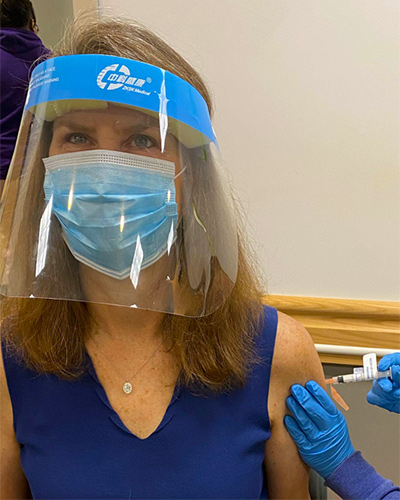
Tuesday, January 05, 2021
Dr. Kathleen Neuzil, World-renowned Leader in Vaccine Research, Receives Moderna Vaccine
Kathleen Neuzil, MD, MPH, FIDSA, the Myron M. Levine, MD, DTPH, Professor of Vaccinology and Director of the University of Maryland School of Medicine’s (UMSOM)’s Center for Vaccine Development and Global Health (CVD), received her first injection of the Moderna vaccine for COVID-19 on December 31. Researchers at the University of Maryland School of Medicine (UMSOM) played an integral part in the dedicated work that led to the U.S. Food and Drug Administration issuing an Emergency Use Authorization for the Moderna vaccine in December.
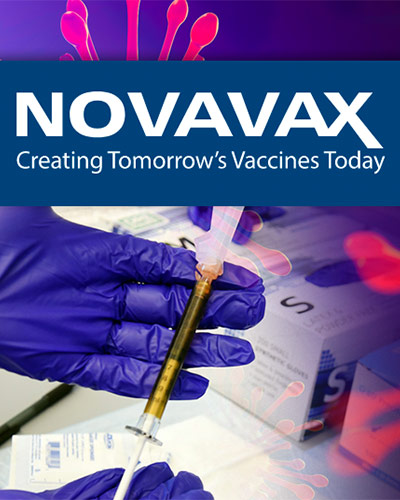
Tuesday, January 05, 2021
University of Maryland School of Medicine Begins Phase 3 Trial of Novavax COVID-19 Vaccine Candidate
Researchers at the University of Maryland School of Medicine (UMSOM) will participate in a Phase 3 clinical trial of an investigational COVID-19 vaccine to protect against SARS-CoV-2, the coronavirus causing COVID-19 that continues to impact millions of people around the world. The clinical trial will test the safety and effectiveness of NVX-CoV2373, being developed by U.S. biotechnology company, Novavax, Inc., based in Gaithersburg, MD.
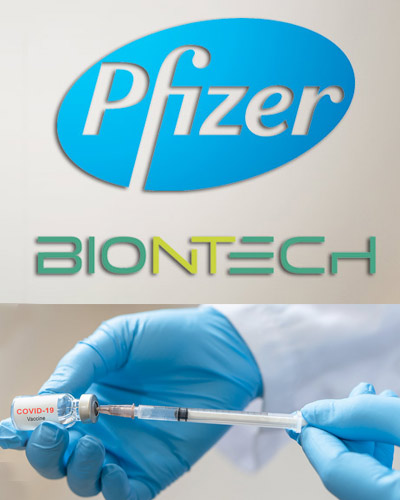
Thursday, November 19, 2020
Promising Results Seen in Pfizer/BioNTech COVID-19 Vaccine After Phase 1 Trial by University of Maryland School of Medicine
Just six months after beginning a clinical development program that first enrolled here at the University of Maryland School of Medicine (UMSOM), Pfizer and BioNTech report interim results showing an mRNA COVID-19 vaccine had no serious safety concerns and has been found to be 95 percent effective in protecting individuals from COVID-19.
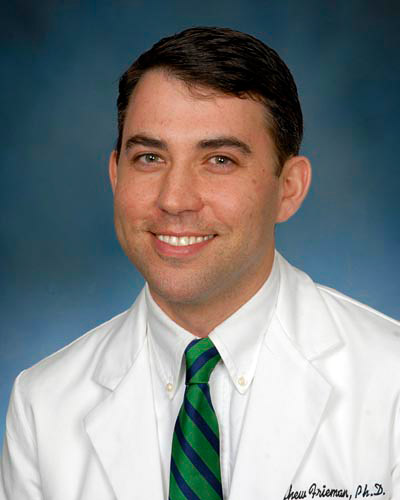
Friday, November 13, 2020
UM School of Medicine and School of Pharmacy Researchers Identify Promising New Compounds to Potentially Treat Novel Coronaviruses
Researchers at the University of Maryland School of Medicine (UMSOM) and School of Pharmacy (UMSOP) have discovered new drug compounds to potentially treat the novel coronavirus that causes COVID-19. The compounds disrupt the functioning of a protein complex inside human cells that the researchers discovered is critical for the replication and survival of coronaviruses. This finding could lead to the development of new broad-spectrum antiviral drugs that target viruses such as influenza, Ebola and coronaviruses, according to a new study published today in the Proceedings of the National Academy of Sciences (PNAS) journal.

Tuesday, June 16, 2020
UM School of Medicine Researchers Receive Federal Funding to Rapidly Test New Treatments for COVID-19
Researchers at the University of Maryland School of Medicine (UMSOM) will be partnering on an agreement funded by the federal government’s Defense Advanced Research Projects Agency (DARPA) to rapidly test hundreds of drugs, approved and marketed for other conditions, to see whether any can be repurposed to prevent or treat COVID-19. The compounds will be tested in studies using state-of-the-art technologies in the laboratory of coronavirus researcher Matthew Frieman, PhD., Associate Professor of Microbiology and Immunology at the University of Maryland School of Medicine. UMSOM will receive up to $3.6 million over the next year to fund this effort.
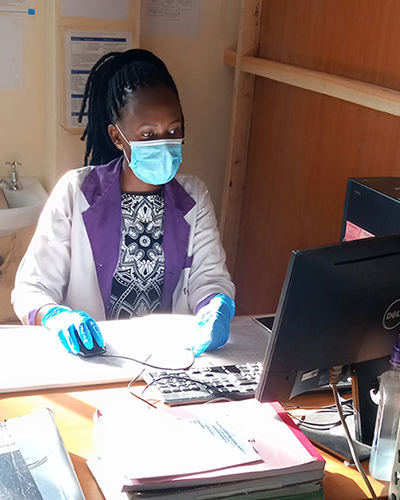
Tuesday, June 02, 2020
UM School of Medicine’s Institute of Human Virology Awarded Grants to Strengthen COVID-19 Response in Sub-Saharan Africa
The Center for International Health, Education and Biosecurity (Ciheb) at the University of Maryland School of Medicine’s Institute of Human Virology was awarded $4 million from the U.S. Centers for Disease Control and Prevention (CDC) to support coronavirus disease 2019 (COVID-19) response activities in Botswana, Nigeria, Malawi, and Mozambique.
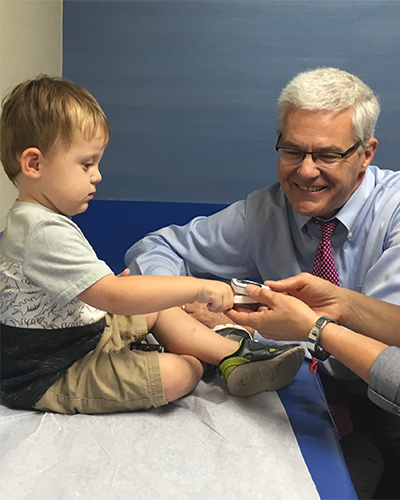
Monday, June 01, 2020
In A COVID-19 World, Another Threat to the Health of Our Children
In the U.S., our children rarely fall ill to grave infections because they are protected by vaccines. Serious illnesses like measles, mumps, congenital rubella syndrome, chickenpox, diphtheria, tetanus, whooping cough, rotavirus diarrhea, hepatitis (A and B), polio and bacterial meningitis are all preventable through routine childhood vaccinations.

Thursday, May 28, 2020
UM School of Medicine Researchers Develop Experimental Rapid COVID-19 Test Using Innovative Nanoparticle Technique
Scientists from the University of Maryland School of Medicine (UMSOM) developed an experimental diagnostic test for COVID-19 that can visually detect the presence of the virus in 10 minutes. It uses a simple assay containing plasmonic gold nanoparticles to detect a color change when the virus is present. The test does not require the use of any advanced laboratory techniques, such as those commonly used to amplify DNA, for analysis. The authors published their work last week in the American Chemical Society’s nanotechnology journal ACS Nano.

Thursday, May 21, 2020
UM School of Medicine Begins First Innovative Trial of Experimental Stem Cell Therapy to Reduce Deaths in Sickest COVID-19 Patients
Researchers at the University of Maryland School of Medicine (UMSOM) have begun testing an experimental stem cell therapy developed by Mesoblast Limited to treat hospitalized COVID-19 patients with moderate to severe acute respiratory distress syndrome (ARDS) who are on ventilators to help them breathe. The trial, which is being conducted at the University of Maryland Medical Center (UMMC) and additional sites across the U.S, will involve a total of 300 patients randomized to receive either the drug remestemcel-L or a placebo in addition to the recommended standard of care to manage severe COVID-19 infections. The first patient in this national trial was treated at UMMC.
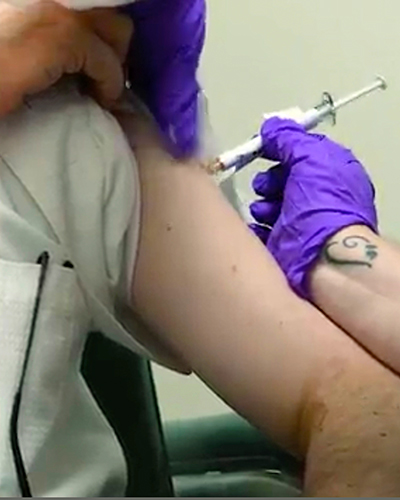
Tuesday, May 05, 2020
UM School of Medicine is First in U.S. to Test Unique RNA Vaccine Candidate for COVID-19
In a significant development in the global effort to discover a safe and effective vaccine for COVID-19, researchers at the University of Maryland School of Medicine (UMSOM) became the first in the U.S. to begin testing experimental COVID-19 vaccine candidates developed by Pfizer and BioNTech. The research, funded by Pfizer Inc., will study the safety, efficacy, and dosing of an experimental mRNA -based vaccine.
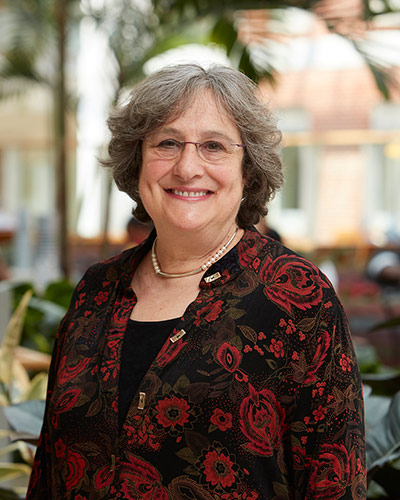
Thursday, April 23, 2020
UM School of Medicine Researchers Test Remdesivir as Potential Therapy for COVID-19 Patients
Researchers at the University of Maryland School of Medicine (UMSOM) are testing the effectiveness of the investigational antiviral drug remdesivir in hospitalized adult patients with SARS-CoV-2 (COVID-19). The randomized controlled clinical trial is evaluating the safety and effectiveness of the drug, and it is part of a national study funded by the National Institute of Allergy and Infectious Diseases (NIAID) of the National Institutes of Health (NIH).
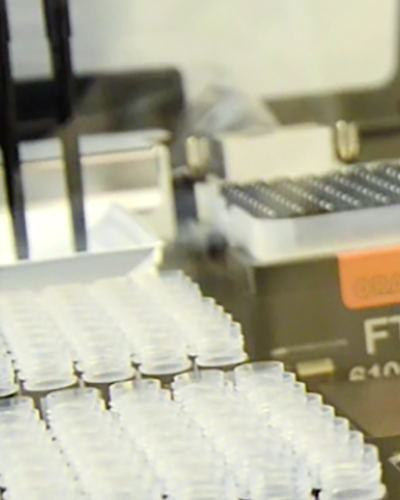
Friday, April 10, 2020
University of Maryland School of Medicine Launches New Large Scale COVID-19 Testing Initiative
University of Maryland School of Medicine (UMSOM) Dean E. Albert Reece, MD, PhD, MBA, announced today the launch of a large-scale COVID-19 Testing Initiative that will significantly expand testing capability over the coming weeks, enabled by new funding of $2.5 million from the State of Maryland.
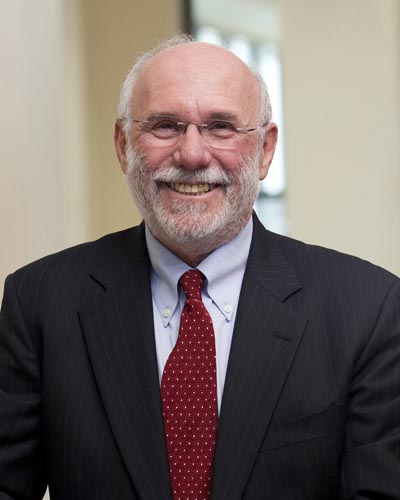
Wednesday, October 30, 2019
UM School of Medicine's Myron M. Levine, MD, DTPH, to Receive Prestigious Lifetime Award for Five Decades of Pioneering Vaccine Research
Myron M. Levine, MD, DTPH, the Simon and Bessie Grollman Distinguished Professor at the University of Maryland School of Medicine (UMSOM), Associate Dean for Global Health, Vaccinology and Infectious Diseases, and Founder and Former Director of the Center for Vaccine Development and Global Health (CVD) is a co-recipient of the 2020 Research! America Geoffrey Beene Foundation Builders of Science Award for his pioneering vaccine and infectious disease research.

Monday, October 21, 2019
UM School of Medicine's Kathleen M Neuzil Elected as Member of Prestigious National Academy of Medicine
Kathleen M. Neuzil, MD, MPH, Professor of Medicine and Pediatrics and Director of the Center for Vaccine Development and Global Health (CVD) at the University of Maryland School of Medicine (UMSOM), has been elected as a member of the National Academy of Medicine (NAM), in recognition of her pivotal research that has informed and shaped global vaccine and public health policy. Her membership was announced at the annual NAM meeting in Washington, D.C., placing her among the 2,178 U.S. members of this important organization. Membership in the Academy is considered one of the highest honors for individuals who have made major contributions to the advancement of the medical sciences, health care and public health.

Monday, August 19, 2019
UM School of Medicine Researcher Warns of Need for Malaria Drug to Treat Severe Cases in U.S.
Each year there are more than 200 million cases of malaria worldwide, a mosquito-borne disease caused by a parasite that brings on fever and body aches and, in some cases, more serious conditions such as coma and death. While the vast majority of these cases occur in sub-Saharan Africa and South Asia, the U.S. each year sees more than 1,500 cases, and currently there is limited access to an intravenously-administered (IV) drug needed for the more serious cases, according to a top malaria researcher at the University of Maryland School Medicine (UMSOM).
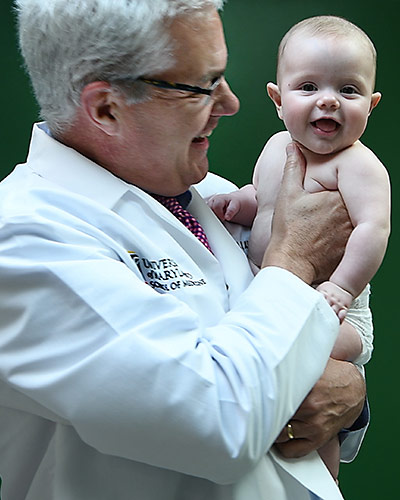
Wednesday, July 17, 2019
Vaccines Tested in UM School of Medicine’s Center for Vaccine Development Protect Children Around the World
For 30 years, the Center for Vaccine Development and Global Health (CVD) at the University of Maryland School of Medicine (UMSOM) has collaborated with the Pediatric Center of Frederick to test vaccines used in pediatric care.

Friday, March 08, 2019
UMSOM Researchers Unveil Progress and Challenges in Introducing Typhoid Conjugate Vaccine in Sub-Saharan Africa and Asia
Each year there are nearly 11 million cases of typhoid, a disease that is spread through contaminated food, drink and water. Researchers at the University of Maryland School of Medicine are leading an international consortium that is studying the impact of a typhoid conjugate vaccine (TCV) in an effort to accelerate introduction of the vaccine in countries in sub-Saharan Africa and Asia where there is a high burden of typhoid.

Wednesday, December 26, 2018
Multicenter Trial Supports Use of Topical Antibiotic as a Tool to Eliminate Staph Colonization in NICU Babies
A team of doctors led by Karen L. Kotloff, M.D., University of Maryland School of Medicine (UMSOM), Center for Vaccine Development and Global Health (CVD), has performed a clinical trial involving multiple hospitals that tested the effectiveness of applying a topical antibiotic known as mupirocin for prevention of Staphylococcus aureus (SA) infection in babies in the neonatal intensive care unit (NICU). This study was published in the journal Pediatrics.
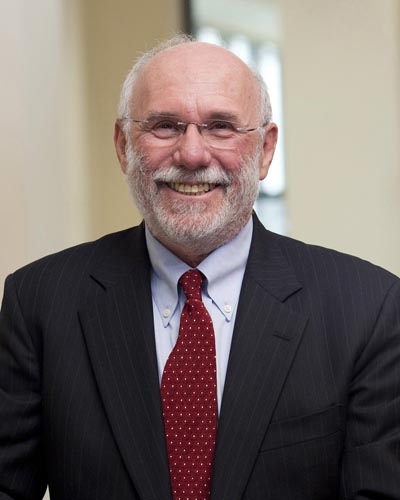
Thursday, December 20, 2018
Data From Largest Global Diarrheal Disease Study Available to Scientists on Public Sites
Data collected from the Global Enteric Multicenter Study (GEMS), a multi-site research project studying diarrheal diseases that was designed and coordinated by researchers in the Center for Vaccine Development and Global Health (CVD) at the University of Maryland School of Medicine (UMSOM), are now available to scientists on two online data resources.
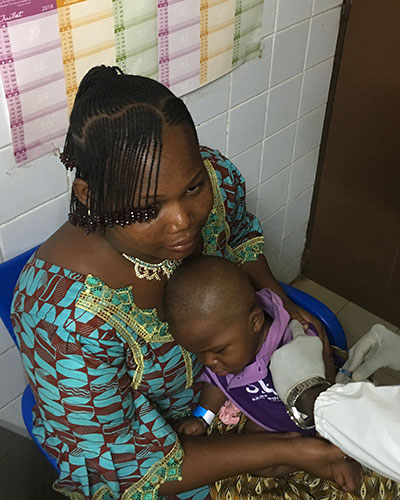
Monday, December 03, 2018
UMSOM and Groupe De Recherche Action En Sante Begin Second Typhoid Conjugate Vaccine Study in Africa
A new study has been launched in Burkina Faso for Bharat Biotech’s typhoid conjugate vaccine (TCV). It is the second clinical study underway in Africa for the vaccine and the first in West Africa. The vaccine study is a joint effort by the Center for Vaccine Development and Global Health (CVD) at the University of Maryland School of Medicine, (UMSOM) and Groupe de Recherche Action en Santé (GRAS) in Burkina Faso.
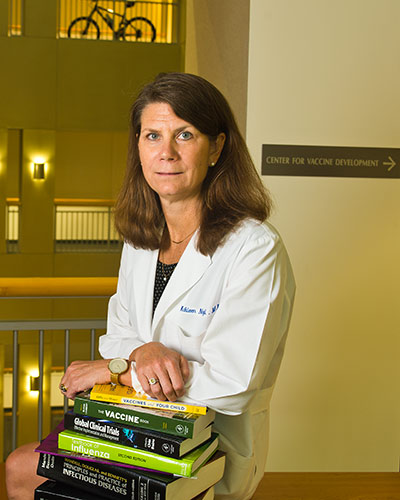
Friday, November 02, 2018
UMSOM Global Health Expert Named to Prestigious World Health Organization Immunization Panel
Kathleen Neuzil, MD, MPH, Professor of Medicine and Pediatrics and Director of the Center for Vaccine Development and Global Health (CVD) at the University of Maryland School of Medicine (UMSOM), has been named to the World Health Organization’s (WHO) Strategic Advisory Group of Experts (SAGE) on Immunization.

Sunday, October 28, 2018
American Society of Tropical Medicine & Hygiene Awards Dr. Miriam Laufer the LePrince Medal for Malaria Research
Miriam Laufer, MD, MPH, Professor of Pediatrics and Associate Director for Malaria Research at the University of Maryland School of Medicine’s (UMSOM) Center for Vaccine Development and Global Health (CVD), was awarded the Joseph Augustin LePrince Medal by the American Society of Tropical Medicine and Hygiene (ASTMH).
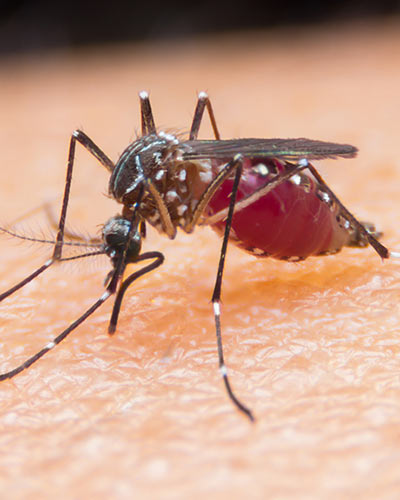
Friday, February 24, 2017
Experimental Malaria Vaccine Provides Durable Protection Against Multiple Strains in NIH Clinical Trial
An experimental malaria vaccine protected healthy subjects from infection with a malaria strain different from that contained in the vaccine, according to a study published this week in the Proceedings of the National Academy of Sciences (PNAS). The research was conducted by scientists at the University of Maryland School of Medicine and the National Institute of Allergy and Infectious Diseases (NIAID), part of the National Institutes of Health (NIH).

